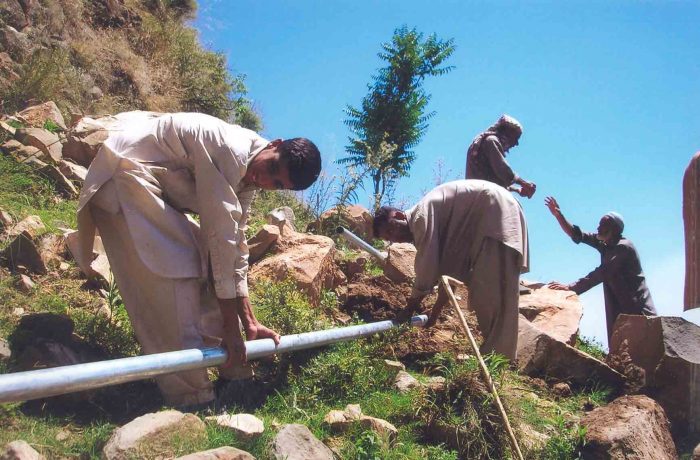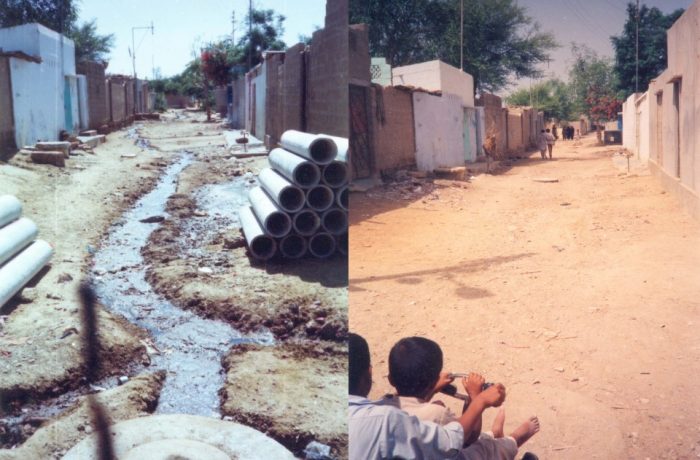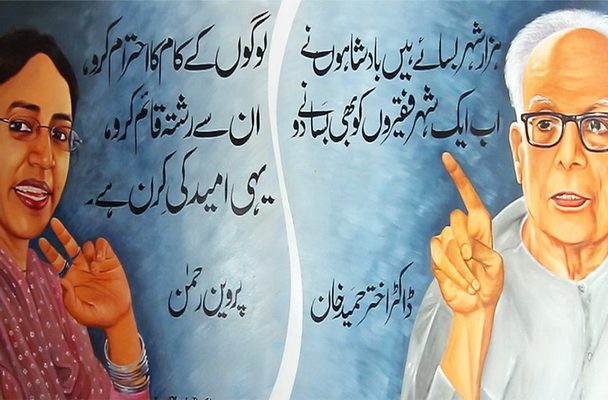
Background
Orangi Pilot Project (OPP) was set up in 1980 by the renowned Social Scientist Dr. Akhtar Hameed Khan to engender, among the poor, in the vast informal settlements of Pakistan, the spirit of acquiring housing, sanitation, clean water, education, health, food security, and livelihood through a community based approach. The Organization began its work in Orangiwhich at the time, with a population of 0.8 million, was considered Asia’s largest squatter settlement.
The first self-built model, the Low Cost Sanitation Model, evolved from intense research and dialogue with the residents by Architect Perween Rahman who joined OPP in 1982. The residents were provided the complete design with details of quantity of material and estimation of cost based on local market rates. The community mobilized to collect the money required to procure pipes, bricks, cement et al and in actually digging trenches, laying the lines, constructing manholes and ultimately connecting the indoor latrines to the disposal pipes. The lane, with an average of 20 houses became the unit of organization in constructing the primary system.
While working on the primary system OPP also facilitated the residents in lobbying with the government to enable the lane to be connected to the secondary disposal lines, mains and treatment plants. OPP provided the government low cost designs of secondary and mains for the construction around Orangi.
Thus was born the perfect People-Government partnership which carried out what OPP called Component Sharing Development. This meant that People invested in and constructed the Internals i.e. the primaries including latrines and the Government invested in and constructed the Externals i.e. secondary, mains etc.
This transaction of OPP’s Low Cost Models through Component Sharing was widely accepted throughout Pakistan as a viable development strategy for low income settlements.
In 1987 OPP was divided into four sections. OPP Research and Training Institute (OPP-RTI) with Perween as its Director carried out Sanitation, Water, Mapping and Youth Training Programs.
OPP – Research and Training Institute (OPP-RTI) manages the low-cost sanitation, housing/secure housing support program, education program, the now evolving water supply, and the women’s savings programs as well as the related research and training programs. Earthquake and the flood rehabilitation works are also undertaken.
OPP-RTI continues to work with both the government and the people, providing both partners with implementable designs; to the former for Externals, and the later for Internals. It gives them estimates and eventually monitors construction of the sewage and water projects.
OPP-RTI does not fund construction. It teaches people to so do through building their capacity by giving them a low cost design, training in mapping, surveying and construction, and overseeing and guiding the implementation.
OPP-RTI designed systems have borne the test of time as lines laid in 1982 still function.
The demonstration of the impact of the program lies in the fact that that now Orangi is a thriving township housing 2.3 million people which, constitutes 10 per cent of Karachi’s population.
Replication of the model continues all over Pakistan where OPPRTI works with local organizations representing the people in tandem with Local Governments.
All program details from the inception in 1980 are meticulously documented and present in the library. Digitized versions of these are available to students, researchers, development workers all over the world.
Since its inception, OPP-RTI has helped over 7.6 Million people get access to water and sewage system.
OPP-RTI’s development methodology is taught in Universities in both the North and South Massachusetts Institute Of Technology USA, soon after Perween’s assassination in 2013, held a two-day seminar titled, Orangi Pilot Project and the Legacy of Perween Rahman.
Perween Rahman was a member of the Oslo Water Academy.
OPP-RTI has won the UN-Habitat Good Practices Award twice.
Habitat-Norway held a seven city tour in October 2018, to highlight OPP’s development methodology and Perween’s role in its annual Urban October event. Events were held in universities in Kristiansand and Trondheim, and with municipal and civic groups in Bergen, Haugusand, Arundel, Oslo, and Stavanger.
The World Urban Forum to be held in February 2020 is to hold a special session on OPP-RTI and Perween Rahman. This session has been organized by Habitat Norway and alongside OPP-RTI will be representatives of Slum Dwellers International, Asian Coalition for Housing Rights, etc.
The Bangkok based Asian Coalition of Housing Rights has instituted a Perween Rahman Fellowship program.



